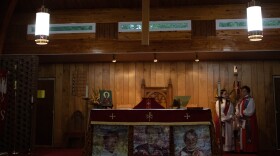This past summer WUNC worked with six youth reporters. Justavis Brooks decided to use the opportunity to face something everyone has to deal with at some point- the pain of losing a loved one.
On December 7, 2006, my brother, Raphael Eason, was shot and killed. I was ten years old and I lived in Virginia. My brother lived with my dad’s side of the family in Elizabeth City, a town in the northeastern part of North Carolina. Since his passing he has been more of a mystery than a memory because no one has said much to me about him or the incident. This summer, I began to question the silence and the reasons behind it. I figured there was no better place to start than with my dad, Troy Brooks.
“I just felt that as you got older you would hear the whole story,” he explained to me. “And I do apologize to you for not talking to you about it, I do, I mean but it’s not something that I can talk about that easy. I can’t. So to sit down and tell my daughter what happened, I just keep both of us in prayer, you know.”
“One of the very first responses to loss and grief is denial,” says Colette Segalla, a psychologist who specializes in family and relationship based issues. She was able to provide me with some more insight as to why my family may have remained quiet these past seven years.
“It is so difficult to deal with that people will sometimes kind of pack it away and it’s safer for them, they feel, not to talk about it. Not to address it at all,” Segalla says.
While denial may have played a part, the more I dug into it the more I learned about everyone’s different motives. My grandma, Earlene Whitehurst, told me about how the community was in an uproar after my brother’s death. No arrests were made initially and because of that, people were led to believe that his murder had become an issue of race. Ralph, a 22-year-old black male, shot down by a 17-year-old white male. Everyone was angry and hungry for revenge. She took it upon herself to play peacekeeper.
“I couldn’t cry because I didn’t want my boys to be upset, but I can cry now,” she says. “I cry to myself, but around the children, around the boys, around the public, when my children was present, I couldn’t cry. Because my boys would have gone crazy. They would have found that young man.”
I didn’t think hearing about Ralph would have such an effect on me, but even after seven years it feels as if it’s happening all over again. Like I’m working backwards. I didn’t get to live out those painful moments after his death because I wasn’t there. I took a trip to Memory Garden Cemetery to visit Ralph’s grave site. There lay a small blue garden light, a bouquet of purple cloth flowers and an aluminum placard with his name on it. The one thing that could signify closure was still missing after all these years—a headstone.
“How can you close that?” my dad asks. “When every day you wake up or every night you’re laying there, and I say every day from the day--December the seventh--to today, every day I think about what happened. So closure, I don’t think I will ever have closure.
Headstones represent the end of things, but I believe that putting a headstone on my brother’s grave would represent the beginning of the healing process. While it may not be easy to move on, we have to start somewhere. Moving on doesn’t mean we’ll forget him—it just means we’ll find better ways to deal with the pain.
“It hurts, it still hurts,” my grandma says. “But God is able to see you through.”
Over the course of this journey I had to face all the hurt, anger, confusion and depression that was kept bottled up over the years. I had to go back and relive the feelings of my brother’s death in order to be able to take that one step forward. And while the pain still echoes through our hearts right now, my grandma’s words send me a wave of comfort. They reassure me that this is only the beginning of a very long process but that with love, and a little faith in God, my family will be able to work through it.











